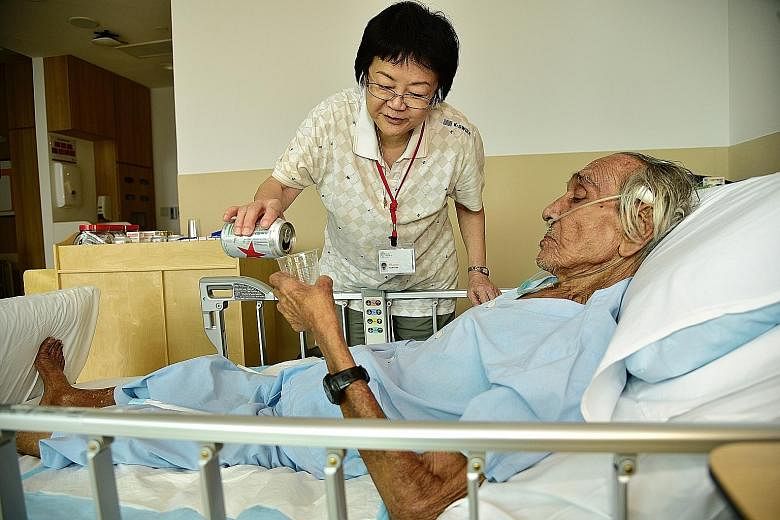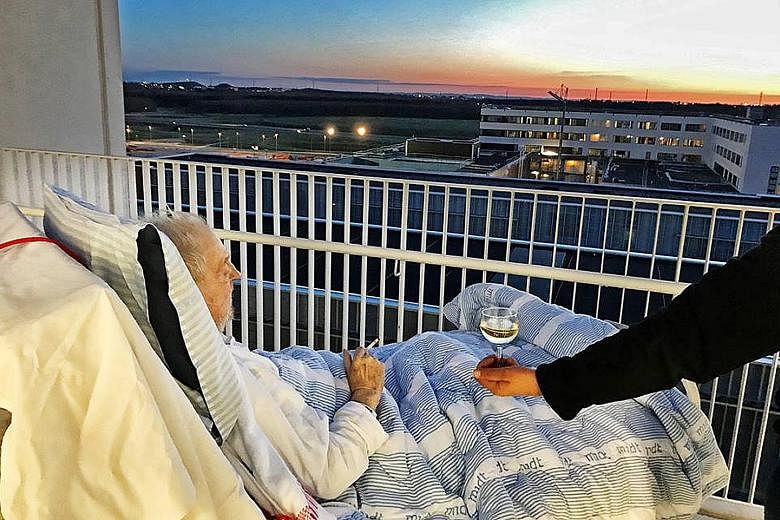Nurses find Mr Klassen Alaric Philip, 80, to be a quiet man.
The only times he shows some personality would be when he refuses to take his medication.
Otherwise, the bachelor with schizophrenia and lung cancer is mostly in a confused and depressed state of mind.
Last Tuesday, however, he perked up when he spotted beer in the Treats Trolley that volunteers push around the wards of Assisi hospice. The trolley contained snacks or drinks meant for patients and their caregivers to indulge in.
The volunteers asked if he preferred Sapporo or Heineken beer.
Mr Klassen took his time before deciding on Heineken.
In less than five minutes, he gulped down three plastic cups of cold beer. The yellow liquid went down so fast, he coughed slightly.
"Slow down, when was the last time you drank beer?" volunteer Pauline Teo, 70, asked him jokingly.
He told her it was in the 1950s on a plane in Vietnam when he was a soldier with the US Army. Then he began reminiscing about his days in the army, rare for a man who usually does not even make eye contact.
Last Tuesday was the first time that Assisi introduced alcohol on its trolley, following several requests from patients.
Said Ms Choo Shiu Ling, Assisi's chief executive: "Patients' wish for a specific type of treat such as cigarettes and alcoholic drinks will be granted as long as it is not excessive in nature or detrimental to their current condition. We grant requests that can be unconventional but meaningful for patients."
Medical institutions worldwide, including those in Singapore, are slowly rethinking what quality of life really means, especially when it comes to patients who are dying. Honouring the personhood and wishes of these terminally ill patients can take precedence over rules or convention.
Last month, a Danish hospital broke protocol to grant 75-year-old Carsten Hansen his last wishes. The nurses at Aarhus University Hospital defied regulations that stipulated no smoking on the hospital's grounds and wheeled Hansen out to a balcony where he smoked a Green LA cigarette and drank a glass of chilled white wine while watching the sunset with his family. He died a few days later.
Dover Park Hospice has also been flexible about offering alcohol to patients.
The last time a patient requested alcohol was years ago. Then, volunteers of its "Happy Hour" team obtained some hard liquor for the patient to drink with his son, as that was what the pair used to do weekly when the father was still healthy.
"It is not so much about bending the rules, but rather listening to the needs of patients," said a Dover spokesman.
Cigarettes are a previously forbidden item that institutions are increasingly giving the green light to.
St Andrew's Community Hospital, which started operating a palliative ward two years ago, allows family members to take patients to an open area for a smoke if they are not on oxygenators.
Patients can also eat "previously forbidden food" such as durians and char kway teow. They can have their own pets brought into the ward for a visit too.
Said a spokesman: "The team tailors care guidelines accordingly to take into account the change in focus from disease prevention treatment to one of comfort and improvement of quality of life.
"Rules and guidelines are meant to protect and not to restrict a patient's freedom. When it no longer serves its purpose, to insist on a restriction reflects an absence of empathy."
Assisi residents can also head out to the garden for a smoke, upon getting the doctor's approval. One patient was even allowed to take a few puffs of smoke in his room because he could not be wheeled out. He died one or two hours after his wish for a cigarette was granted.
However, meeting the needs of patients sometimes goes beyond closing one eye on consuming certain forbidden food.
Dover Park hospice once had a patient who used to play the harmonica every morning to park users and he missed the feeling of performing for an audience.
However, he had a prolapsed stoma, meaning a protruding bowel, and any exertion of blowing on the harmonica could have aggravated his condition.
Given the risk, the hospice team arranged for him to hold a mini concert for other patients and their family members but negotiated with him on the number of pieces he could perform and inserted a singalong segment halfway through so that he could take a break while the clinicians assessed his condition.
It was a decision that the patient clearly did not regret making.
Said the spokesman from Dover: "He was talking about the experience for the rest of his days with us until his demise and the stoma was the least of his concerns."
For Mr Klassan, how much happiness can a simple can of beer bring?
Enough for him to start debating with this reporter on the merits of the various brands of beer. "I enjoy Heineken, it has the same light taste as Carlsberg," he said. "ABC and Tiger are too strong."



